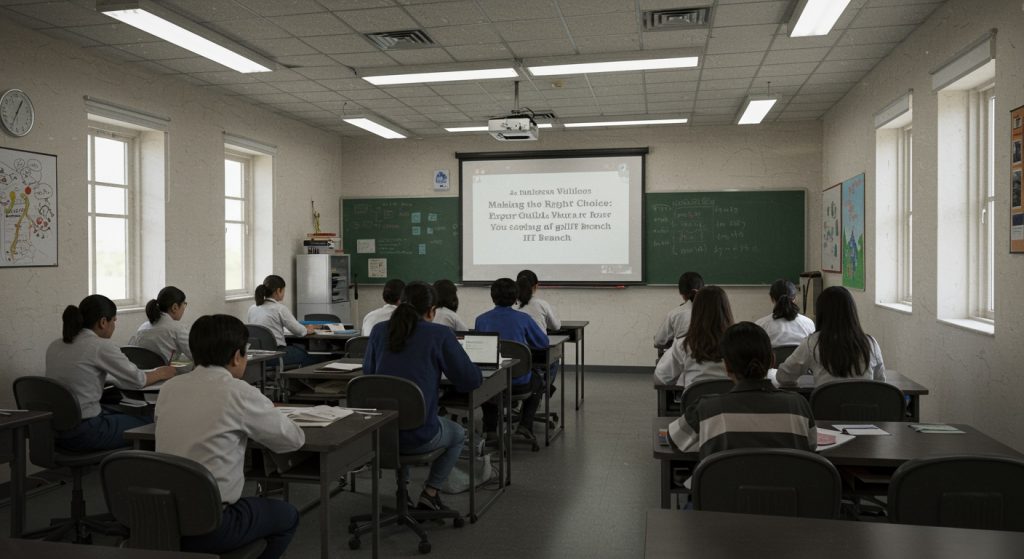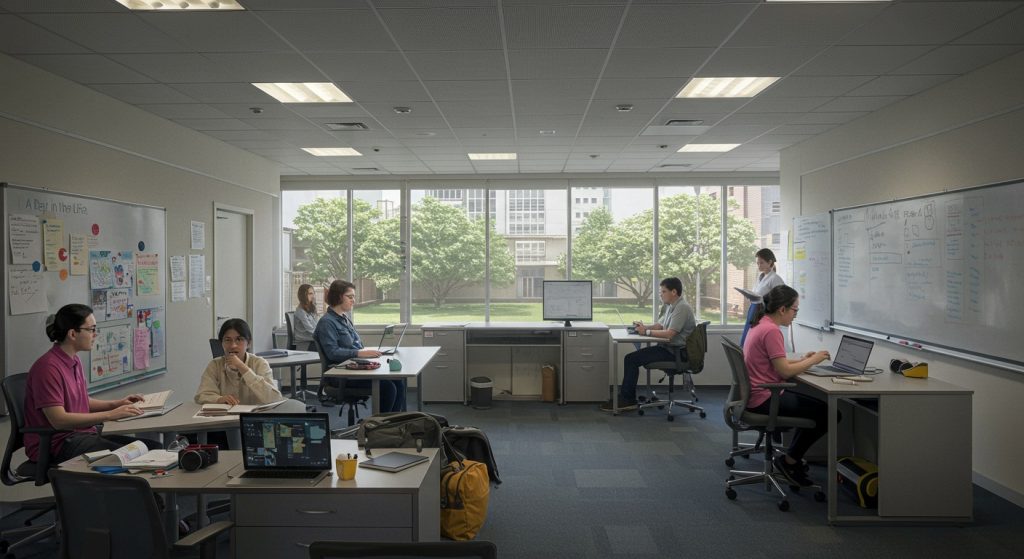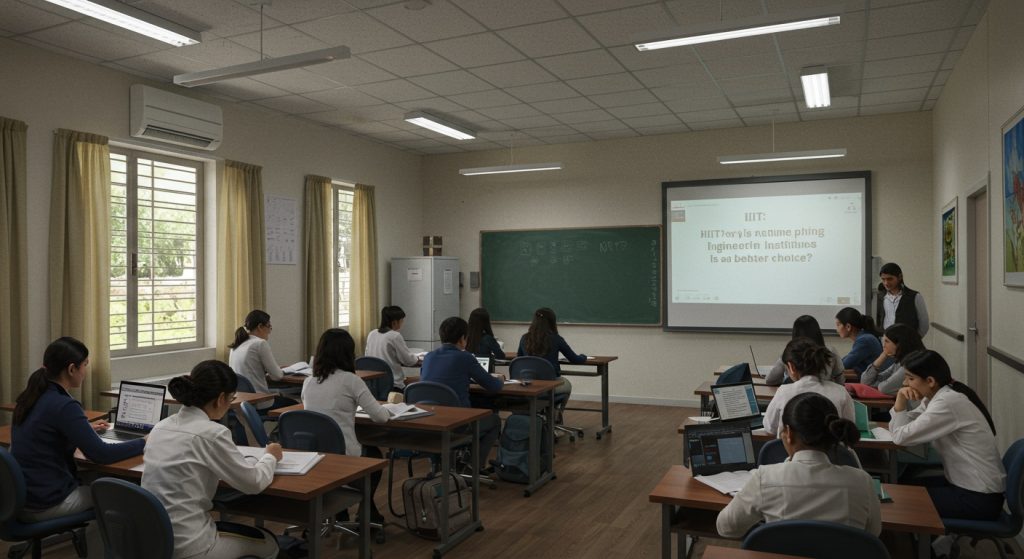Securing an IIT seat marks a significant achievement. The subsequent choice of an engineering branch profoundly shapes your career trajectory. Beyond the traditional allure of Computer Science, consider the dynamic landscape where Artificial Intelligence, Machine Learning. Data Science are redefining industries, even impacting core sectors like Manufacturing and Civil Engineering through robotics and smart infrastructure. While a high JEE rank might open doors to popular branches, evaluating your intrinsic aptitude for complex problem-solving in areas like quantum computing or sustainable energy systems proves crucial. The future demands interdisciplinary acumen, where a Mechanical Engineering graduate might leverage computational fluid dynamics for aerospace innovation, or an Electrical Engineer designs advanced embedded systems for autonomous vehicles. Your ideal branch aligns not just with market demand. With your intellectual curiosity and long-term professional aspirations in this rapidly evolving technological era.

Understanding the IIT Dream and the Branch Dilemma
The Indian Institutes of Technology (IITs) represent the pinnacle of engineering education in India, a dream for millions of aspiring students. Gaining admission to one of the Top IITs is a monumental achievement, a testament to years of dedication and hard work. But, the journey doesn’t end with clearing the JEE Advanced. A crucial, often overwhelming, decision awaits: selecting the right engineering branch. This choice is far more than just picking a subject; it’s about aligning your future career path, your daily academic life for the next four years. Ultimately, your personal and professional fulfillment. This guide aims to demystify the process, offering a comprehensive framework to help you navigate this pivotal decision with confidence and clarity.
Beyond the Hype: Debunking Common Myths About IIT Branches
Before diving into specific branches, it’s essential to clear the air of common misconceptions that often cloud judgment during branch selection. Falling prey to these myths can lead to regret and misalignment with your true potential.
- Myth 1: “Computer Science and Engineering (CSE) is the only good branch.” While CSE is undoubtedly popular and offers excellent career prospects, it’s a grave mistake to assume it’s the sole path to success or happiness. Other branches offer equally rewarding, diverse. Impactful careers. The ‘best’ branch is subjective and depends entirely on your interests and aptitudes.
- Myth 2: “Only ‘core’ engineering branches (like Mechanical, Civil) lead to traditional, less innovative jobs.” This is far from the truth. Core branches are evolving rapidly, integrating cutting-edge technologies like AI, robotics. Advanced materials. A Mechanical Engineer might be designing sustainable electric vehicles, while a Civil Engineer could be building smart cities using IoT.
- Myth 3: “An IIT degree guarantees success, regardless of the branch.” While the IIT brand carries significant weight, your success ultimately hinges on your effort, passion. Adaptability within your chosen field. A disengaged student in a ‘top’ branch might fare worse than a highly motivated one in a ‘less popular’ branch.
- Myth 4: “Lower-ranked branches have no future.” Every branch at an IIT is designed to equip you with a robust foundation. What might appear as a ‘lower’ branch based on JEE cutoffs often has niche industries, research opportunities. A strong demand for specialized skills that are less common in the market.
The actionable takeaway here is to look beyond popular perception and explore what truly resonates with you, rather than blindly following trends.
Self-Assessment: Knowing Yourself Before Choosing
The most critical step in selecting your ideal IIT branch is a thorough self-assessment. This isn’t just about what you’re ‘good at’ in exams. What genuinely excites and motivates you. Consider the following:
- Interests & Passions
- Aptitude & Strengths
- Career Aspirations & Goals
- Values
What subjects or topics do you genuinely enjoy learning about, even outside of academics? Do you love dissecting how machines work? Are you fascinated by the human body and its processes? Do algorithms and problem-solving thrill you? Your innate curiosity is a powerful guide.
Beyond interest, where do your natural talents lie? Are you strong in abstract mathematical reasoning (good for CSE, Electrical)? Do you excel in visualizing 3D structures and understanding physical forces (Mechanical, Civil)? Are you detail-oriented and precise (Chemical, Biotechnology)? Understanding your cognitive strengths will help you thrive.
While it’s okay not to have a fixed career plan, think broadly about the kind of work environment you envision. Do you want to be involved in cutting-edge research, develop software, design physical products, manage projects, or perhaps even start your own venture? Different branches lead to different ecosystems.
What do you value in a profession? Is it innovation, making a societal impact, financial stability, work-life balance, or continuous learning? For example, someone passionate about environmental sustainability might find a calling in Civil or Chemical Engineering with a focus on green technologies.
As Dr. A. P. J. Abdul Kalam often emphasized, “Excellence is a continuous process and not an accident.” This excellence begins with aligning your path with your inherent strengths and passions.
Deep Dive into Popular IIT Branches: What Each Offers
Let’s explore some of the prominent engineering disciplines offered at IITs, understanding their core focus, typical applications. The kind of skills they foster.
Computer Science & Engineering (CSE)
The study of computation and its applications. This includes algorithms, data structures, programming languages, software design, artificial intelligence, machine learning, computer networks. Cybersecurity.
Problem-solving, logical reasoning, mathematical aptitude, programming proficiency, analytical thinking, abstract reasoning.
Software Developer, Data Scientist, AI/ML Engineer, Cybersecurity Analyst, Web Developer, App Developer, Product Manager, Researcher. Companies like Google, Microsoft, Amazon. Numerous startups are major recruiters.
From the apps on your phone to complex financial trading systems, CSE underpins modern technology. Consider a simple sorting algorithm:
function bubbleSort(arr) { let n = arr. Length; for (let i = 0; i < n - 1; i++) { for (let j = 0; j < n - 1 - i; j++) { if (arr[j] > arr[j + 1]) { // Swap elements let temp = arr[j]; arr[j] = arr[j + 1]; arr[j + 1] = temp; } } } return arr;
}
This
bubbleSort function, though basic, illustrates a fundamental concept in CSE: designing efficient steps to organize data, which is crucial for everything from database management to search engine optimization.
Electrical Engineering (EE)
The study and application of electricity, electronics. Electromagnetism. This encompasses power systems, control systems, signal processing, telecommunications, microelectronics (VLSI design). Embedded systems.
Strong mathematical foundation, circuit analysis, analytical thinking, problem-solving, understanding of physics principles, attention to detail.
Electronics Design Engineer, Power Systems Engineer, Telecommunications Engineer, VLSI Design Engineer, Robotics Engineer, Control Systems Engineer, Embedded Systems Developer. Companies include Intel, Qualcomm, Texas Instruments, Siemens. Various power utilities.
Mechanical Engineering (ME)
Design, analysis, manufacturing. Maintenance of mechanical systems. This includes thermodynamics, fluid mechanics, solid mechanics, materials science, machine design, robotics. Automation.
Spatial reasoning, problem-solving, design thinking, understanding of physical principles, hands-on aptitude, analytical skills.
Design Engineer, Manufacturing Engineer, R&D Engineer, Automotive Engineer, Aerospace Engineer, Robotics Engineer, HVAC Engineer. Industries span automotive, aerospace, manufacturing, energy. Robotics.
Civil Engineering (CE)
Design, construction. Maintenance of the physical and naturally built environment. This includes structures (buildings, bridges), transportation systems (roads, railways), water resources, environmental engineering. Urban planning.
Problem-solving, design, project management, understanding of materials, analytical thinking, attention to safety and sustainability.
Structural Engineer, Transportation Engineer, Environmental Engineer, Geotechnical Engineer, Urban Planner, Construction Manager. Opportunities exist in government agencies (PWD, Railways), construction companies. Infrastructure development firms.
Chemical Engineering (ChE)
Application of physical sciences (physics, chemistry), life sciences (biology, microbiology). Mathematics to design, operate. Optimize processes that transform raw materials into valuable products. This involves process design, reaction engineering, separations. Materials science.
Strong foundation in chemistry and physics, analytical thinking, process optimization, problem-solving, attention to detail, safety awareness.
Process Engineer, R&D Scientist, Materials Engineer, Environmental Engineer, Pharma Production Engineer. Industries include petrochemicals, pharmaceuticals, food and beverage, specialty chemicals. Sustainable energy.
Aerospace Engineering (AE)
Design, development, testing. Production of aircraft, spacecraft, missiles. Rockets. This involves aerodynamics, propulsion, flight mechanics, structures. Control systems.
Strong physics and mathematics, spatial reasoning, design aptitude, analytical thinking, attention to detail, precision.
Aircraft Designer, Propulsion Engineer, Flight Test Engineer, Space Systems Engineer, Aerodynamics Specialist. Major employers include ISRO, DRDO, HAL, Boeing, Airbus (globally). Private space companies.
Metallurgical & Materials Engineering (MME)
The study of the properties, processing. Applications of materials, including metals, ceramics, polymers. Composites. This involves understanding how materials behave under different conditions and designing new materials for specific uses.
Strong chemistry and physics, analytical thinking, experimental design, problem-solving, attention to detail.
Materials Scientist, Metallurgist, R&D Engineer, Quality Control Engineer, Process Engineer. Industries span automotive, aerospace, manufacturing, electronics, healthcare. Energy.
Engineering Physics (EP)
A highly interdisciplinary branch that blends core physics principles with engineering applications. It aims to develop engineers with a deep understanding of fundamental science, enabling them to work on cutting-edge technologies. Areas include quantum mechanics, optics, solid-state physics. Nanotechnology.
Exceptional analytical and problem-solving skills, strong mathematical foundation, deep understanding of physics, research aptitude.
Research Scientist, Quantum Computing Engineer, Nanotechnology Specialist, Photonics Engineer, Data Scientist (due to strong analytical skills). Often leads to higher studies and research roles in academia or R&D labs.
Biotechnology (BT)
Application of biological systems and organisms to develop new technologies and products. This includes genetic engineering, biochemical engineering, bioprocess technology, bioinformatics. Medical biotechnology.
Strong foundation in biology, chemistry. Mathematics, analytical thinking, experimental design, ethical awareness.
Research Scientist, Bioprocess Engineer, Pharmaceutical Engineer, Bioinformatics Specialist, Quality Control Analyst. Industries include pharmaceuticals, healthcare, agriculture, food processing. Environmental management.
Interdisciplinary Programs (e. G. , Data Science, AI, Robotics)
Many Top IITs are now offering specialized or interdisciplinary programs, often at the postgraduate level or as dual degrees, that focus on emerging fields. These branches are designed to meet the growing demand for specialized skills at the intersection of traditional disciplines.
- Data Science & AI
- Robotics & Automation
Blends computer science, statistics. Domain knowledge to extract insights from data and build intelligent systems.
Combines elements of Mechanical, Electrical. Computer Science to design, build. Control robots and automated systems.
These fields require a strong foundation in core engineering principles, often drawing from multiple disciplines. Offer exciting, future-proof career paths.
The “Branch vs. College” Conundrum: A Strategic Decision
One of the most challenging dilemmas for many aspirants is choosing between a highly desired branch in a newer or slightly lower-ranked IIT versus a less preferred branch in one of the Top IITs (like IIT Bombay, IIT Delhi, IIT Madras, IIT Kanpur, IIT Kharagpur). There’s no one-size-fits-all answer. The right choice depends on your individual priorities.
Here’s a comparison to help you weigh your options:
| Factor | Prioritizing Branch (e. G. , CSE at IIT-Bhubaneswar) | Prioritizing Top IIT (e. G. , Civil at IIT-Bombay) |
|---|---|---|
| Passion & Interest | Higher likelihood of deep engagement, motivation. Academic success in a field you genuinely love. | May require cultivating interest in a less preferred field; risk of disengagement if passion is low. |
| Peer Group & Network | Excellent peers within your specific branch; broader network within a good IIT. | Access to a highly accomplished, diverse. Competitive peer group across all branches in a Top IIT, fostering a strong overall network. |
| Faculty & Research Opportunities | Specialized faculty and potentially more hands-on research opportunities within your chosen field. | Access to world-class faculty, cutting-edge research. State-of-the-art infrastructure across all disciplines, even if not directly in your primary area of interest. |
| Placement Opportunities | Strong placements within that specific branch; potentially niche roles. | Broader range of companies recruit from Top IITs; more opportunities for inter-branch mobility or non-core roles due to the overall brand pull. |
| Campus Culture & Resources | Good campus life and resources tailored to a specific branch. | Often unparalleled campus resources, extensive alumni network, diverse extracurricular activities. A vibrant overall ecosystem that can shape your personality beyond academics. |
| Alumni Network | A strong and supportive network specific to your branch and college. | An incredibly vast and influential alumni network across all fields, often providing significant career advantages and mentorship. |
If you have an overwhelming passion for a specific branch and can’t imagine studying anything else, prioritizing the branch might be wise. But, if you are flexible with your branch and value the overall ecosystem, peer group. Brand value, aiming for a Top IIT, even if it means a slightly less preferred branch, can open up many doors. Many students from ‘core’ branches at Top IITs successfully transition into IT, consulting, or finance roles due to the strong analytical skills and brand reputation.
Exploring Emerging Fields and Future Trends
The technological landscape is constantly evolving. So are the demands on engineers. While traditional branches remain foundational, understanding emerging fields can help you future-proof your choice. Many of these are interdisciplinary, drawing from multiple core branches.
- Artificial Intelligence (AI) & Machine Learning (ML)
- Data Science
- Robotics & Automation
- Internet of Things (IoT)
- Cybersecurity
- Renewable Energy & Sustainable Technologies
- Quantum Computing
- Biomedical Engineering
Revolutionizing industries from healthcare to finance. Strong roots in CSE. Increasingly relevant for Electrical, Mechanical. Even Biotechnology.
Extracting insights from vast datasets. A blend of CSE, Mathematics. Statistics.
The future of manufacturing, logistics. Even healthcare. Combines Mechanical, Electrical. Computer Science principles.
Connecting physical devices to the internet. Draws heavily from EE, CSE. Sometimes ME.
Protecting digital assets. Primarily CSE. With applications across all digital infrastructure.
A critical field for the future, involving aspects of Electrical, Chemical. Mechanical Engineering.
An advanced field primarily rooted in Engineering Physics and Computer Science.
Applying engineering principles to medicine and healthcare. Often a specialized area within Electrical, Mechanical, or Biotechnology.
Regardless of your chosen core branch, actively seek out electives, projects. Internships in these emerging areas. IITs provide ample opportunities for interdisciplinary learning, allowing you to adapt and specialize as your interests evolve.
Practical Steps: How to Research and Decide
Making an informed decision requires active research. Here’s how you can go about it:
- Deep Dive into IIT Websites
- Talk to Alumni and Current Students
- Attend Open Houses & Webinars
- Read Industry Reports & News
- Mock Counselling Sessions
Explore the curriculum for each branch at various IITs. Look at the courses offered, faculty profiles, research labs. Ongoing projects. This gives you a concrete idea of what you’ll be studying.
Leverage platforms like LinkedIn, Quora. College-specific forums to connect with individuals studying or working in different branches. Their first-hand experiences can provide invaluable insights into daily life, academic rigor. Career prospects.
Many IITs conduct online or offline events for prospective students. These are excellent opportunities to hear directly from professors and current students, ask questions. Get a feel for the campus environment.
Stay updated on the latest trends in various engineering sectors. Publications like “The Economic Times,” “Forbes,” and technology journals can offer insights into job market demands and future growth areas.
Participate in mock counselling sessions conducted by coaching institutes or online platforms. This simulates the actual counselling process and can help you comprehend cutoff trends and your options.
Create a detailed pros and cons list for each branch you’re considering, weighing them against your self-assessment. Don’t be afraid to change your mind as you gather more details. Ensure your final decision is well-researched and reflects your priorities.
Real Stories: Alumni Perspectives and Career Paths
The journey of IIT alumni vividly illustrates that success isn’t confined to a single branch. Diverse paths lead to fulfilling careers, often leveraging the strong foundational knowledge gained at IITs.
Consider Rohan, an alumnus from IIT Bombay’s Chemical Engineering program. Despite the prevailing trend towards Computer Science, Rohan had a deep fascination with sustainable energy solutions. He pursued his passion, worked on advanced battery technology during his B. Tech. Is now a lead R&D engineer at a major renewable energy firm, making a tangible impact on climate change. His story underscores that true success often comes from aligning your studies with your genuine interests, not just market trends.
Or take Priya, an IIT Delhi Mechanical Engineering graduate. Many might assume she’d end up in manufacturing or automotive. Instead, Priya developed a strong interest in robotics and automation. She interned at a robotics startup, joined a leading e-commerce giant’s logistics automation team post-graduation. Is now designing sophisticated warehouse robots. Her journey shows how a solid foundation in a core engineering discipline can be a springboard into cutting-edge, interdisciplinary fields.
These examples highlight a critical point: an IIT education, regardless of the branch, equips you with unparalleled problem-solving skills, analytical thinking. A rigorous approach to learning. These transferable skills are highly valued across industries, allowing for significant career mobility and adaptation to new challenges.
Leveraging Resources: Mentors, Online Forums. Campus Visits
You don’t have to navigate this decision alone. Several resources can provide valuable perspectives and support:
- Seek Mentorship
- Engage in Online Communities
- Virtual or Physical Campus Visits
- Career Counsellors
If possible, connect with engineers, professors, or IIT alumni who can offer guidance based on their experience. A mentor can provide a broader perspective on career paths and industry trends.
Forums like Quora, Reddit (e. G. , r/JEENEETards). Various JEE-specific discussion boards are filled with students and alumni willing to share their experiences and answer questions. Be discerning. These platforms can offer a wide range of opinions.
If feasible, visit the IIT campuses you are considering. Experience the environment, talk to students. Absorb the atmosphere. Many IITs also offer virtual tours and online orientation sessions that can provide a good feel for the institution.
Professional career counsellors specializing in higher education can help you with self-assessment tools and provide structured guidance on matching your profile with suitable branches.
Gather diverse opinions. Remember that the final decision is yours. Weigh all the insights against your personal aspirations and strengths to make a choice that truly reflects your ideal path.
Conclusion
The journey to selecting your ideal IIT branch is deeply personal, transcending mere JEE rank. Rather than chasing perceived “top” branches, consider where your genuine curiosity lies. For instance, while Computer Science remains popular, the rapid evolution of fields like Artificial Intelligence, particularly Generative AI. Sustainable Energy Engineering, presents vast, exciting opportunities. I’ve personally observed students thrive not just in traditional streams. Also in interdisciplinary areas like Computational Biology, where passion truly fuels innovation. My actionable tip: delve into the actual course curricula and speak with seniors in branches you’re considering. Don’t just look at placement statistics from five years ago; consider current industry trends, such as the burgeoning demand for experts in Green Technologies or Quantum Computing. Your IIT experience is what you make of it; choose a branch that ignites your intellect and aligns with your long-term vision, not just current fads. Embrace this decision with confidence – your future in a chosen field awaits.
More Articles
Top Engineering Universities in France: A Comprehensive Guide for 2025
Best UK Universities For Artificial Intelligence Research In 2025
Applying to French Universities: Your Step-by-Step Guide for Success
Public vs. Private Universities in France: Which is Right for You?
International Students: Application Checklist for Top UK Universities
FAQs
How much does my JEE rank really matter when picking an IIT branch?
While your JEE rank definitely sets the initial boundaries for what’s available, it shouldn’t be the only factor. It opens doors. Your personal interests, career goals. Even the specific curriculum of a branch at a particular IIT should weigh heavily in your final decision. Don’t just pick the highest-ranked branch you can get; pick the best fit for you.
Should I just go for Computer Science (CSE) because everyone else does, or follow my passion?
This is a classic dilemma! While CSE is undeniably popular and offers great opportunities, blindly following the crowd isn’t wise. If your true passion lies in Electrical, Mechanical, Chemical, or even Civil Engineering, you’ll likely excel and be happier in that field. True success often comes from dedication and genuine interest, not just market demand. Explore all options and see where your skills and curiosity align best.
What’s the best way to research different IIT branches before making a choice?
Dive deep! Look at the detailed curriculum for each branch on the IITs’ official websites. Talk to current students or alumni from different branches – they offer invaluable real-world insights. Explore career prospects and industry trends related to each field. Also, consider attending webinars or open houses if available. Don’t rely just on hearsay; do your own homework.
How do future job prospects influence my branch selection?
Future job prospects are certainly an essential consideration. Try not to let them be the sole deciding factor. The job market evolves rapidly. A branch that’s ‘hot’ today might not be in 10-15 years. Instead, focus on choosing a branch that equips you with strong foundational skills, critical thinking. Adaptability. These qualities will make you employable across various industries, regardless of specific trends.
Is it possible to switch branches after I join an IIT?
Yes, branch change options exist at most IITs. They are typically very competitive and subject to strict academic criteria. You usually need to maintain an exceptionally high GPA in your first year. The availability depends on the number of vacant seats in the desired branch. It’s not something to bank on, so try to make the best possible choice initially rather than planning for a switch.
Does the specific IIT campus matter more than the branch I choose?
It’s a balance. Both the IIT campus (its legacy, faculty, research opportunities, student culture) and the specific branch contribute significantly to your overall experience and future trajectory. A top branch at a newer IIT might offer cutting-edge research, while a slightly less ‘hyped’ branch at an older, established IIT could provide unparalleled networking and a rich academic environment. Prioritize the combination that aligns best with your goals and learning style.
My parents have strong opinions about which branch I should choose. How do I handle this?
It’s common for parents to have expectations, often stemming from their desire for your success and security. The best approach is open, calm communication. Share your research, explain your interests. Discuss your career aspirations. Involve them in the process by showing them the curriculum details or connecting them with alumni if possible. Ultimately, it’s your four years and your career, so strive for a decision that you genuinely feel good about, while respectfully considering their advice.



